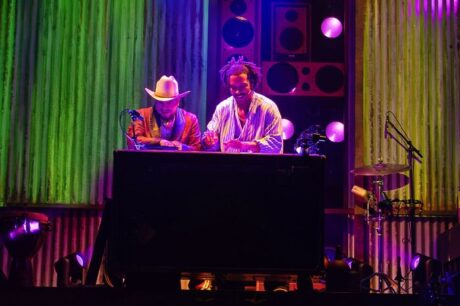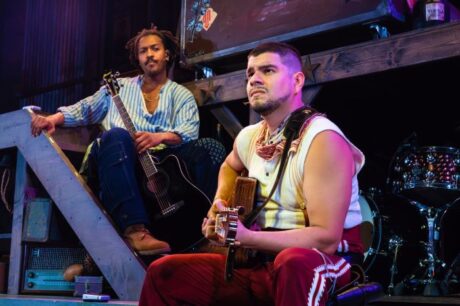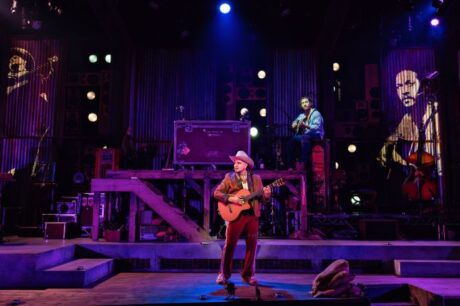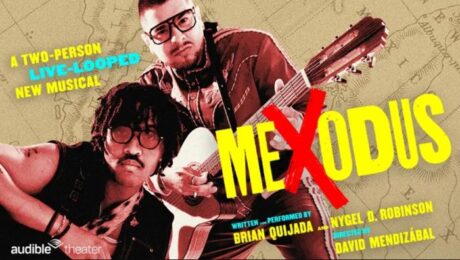While the history of the Underground Railroad that helped slaves from below the Mason-Dixon line escape to freedom in the North and Canada has been well-documented and taught, few have heard of the network that ran south, across the Rio Grande into Mexico (where slavery was abolished in 1829), which saved an estimated 4,000-10,000 enslaved people through 1865, when Abraham Lincoln’s Emancipation Proclamation was finally enacted. That little-known fact is the subject, being passed down by word of mouth, of the groundbreaking hip-hop musical Mexodus, written and performed by the phenomenal duo of Brian Quijada and Nygel D. Robinson, presented by Audible Theater and P3 Productions, and now in its NYC premiere at Audible’s Minetta Lane Theatre. Prior to its current engagement, the profoundly illuminating, deeply moving, and highly entertaining blockbuster ran in DC, where it won three prestigious Helen Hayes Awards for Outstanding Production, Lead Actor, and Director. It’s sure to garner many more in New York.

We are immediately looped into the two-hander with a warm and friendly direct-address welcome to the audience, invitation to react to the performance and to dance to the beat, and introduction of themselves by Robinson and Quijada, setting the stage for the revealing experience with how the story and its characters relate to their own lives and heritage. They also begin the live-looping (not pre-recorded) musical soundscape (sound and looping systems by Mikhail Fiksel) that accompanies their singing and playing of sixteen tracks on a wide array of instruments, from bass, guitar, keyboards, piano, and percussion to accordion and washboard, in a range of styles that includes rap, beatboxing, hip-hop, spirituals, classical, and Mexican folk rhythms – all affirming the supreme skills of the multi-talented duo, as does their empathetic acting, touches of humor to alleviate the horrors of the penetrating truth-telling, and animated moves around the stage and to the music (choreography by Tony Thomas), under the dynamic and gripping direction of David Mendizábal.

The harrowing narrative is conveyed through songs and enacted scenes, to tell the story of the Black slave Henry (portrayed by Robinson), who relays that he was sexually accosted by the slave master’s wife, then blamed for the assault by her and her husband, who walks in on the incident and brutally beats Henry with a board, until he fights back and kills him. Fleeing from slavery and prosecution for murder in Texas (part of Mexico from 1821-36, until its annexation by the US in 1845, which triggered the Mexican-American War), Henry swims across the Rio Grande, is struck by a severe storm, and is saved from drowning by Carlos (played by Quijada), a former Mexican medic in the war, whose land was usurped and is now working as a farmer for another landholder. The connection develops between the two men through a series of ups and downs, as Carlos heals Henry, they aid and fight one another, and ultimately form an unbreakable bond of understanding in the face of their shared struggles with ongoing oppression.
There are also salient references to the Old Testament’s Book of Exodus (from which the title Mexodus is derived), in Henry calling the slave master “Pharaoh,” the reciprocal justice of “an eye for an eye” from the ancient Code of Hammurabi, and the Israelites’ escape out of Egypt, as heard in the traditional slave song “Wade in the Water.” And there are out-of-character personal asides by the actors, recounting significant memories from their own childhoods, and concluding with an empowering anthem that they’re in this together, “when Black and Brown bodies continue being hunted.”

A multi-level set (by Riw Rakkulchon), filled with the musical instruments and looping devices, burlap bags, barrels, and farming tools, recalls the interior of a barn, with a back wall of speakers and lights, interspersed with corrugated metal panels and projections (by Johnny Moreno) that show live-feed close-ups of the actors and images of other characters and locales referenced in the story. Costumes (by Mendizábal) combine current street clothes with traditional western wear, and lighting (by Mextly Couzin) shines a spotlight on the featured actors, shifts with the times of day and moods, rotates around the stage and into the house for the bounty-hunting scenes, and even includes bright colors and a disco ball that bring the theme into a more current era (as does the show’s potent observation that “liberation in this nation is still being confronted”).
An audio version of Mexodus will be released as an Audible Original for streaming or download on June 18, 2026; to pre-order, click here. In the meantime, I strongly recommend that you don’t miss the superb performances in this powerhouse stage production and never forget its ever-timely message.
Running Time: Approximately 90 minutes, without intermission.

Mexodus plays through Saturday, October 18, 2025, at Audible’s Minetta Lane Theatre, 18 Minetta Lane, NYC. For tickets (priced at $49.37 -154.01, including fees), go online, or find discount tickets at TodayTix.


